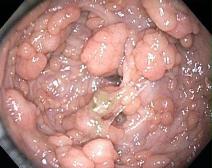Drug Combo Reduced Polyps in Patients With CRC-Related Familial Disorder
The combination use of sulindac and erlotinib significantly reduced the number of small intestine, or duodenal, polyps present in patients with familial adenomatous polyposis.
FAP is associated with the formation of hundreds or thousands of polyps in the colorectum

The combination use of sulindac and erlotinib significantly reduced the number of small intestine, or duodenal, polyps present in patients with familial adenomatous polyposis (FAP), an inherited disorder associated with an increased risk for colorectal cancer.
A study looking at the drug combination in 46 patients with FAP was stopped early when an interim analysis showed the superiority of the drug combination in comparison with placebo.
“Further research is necessary to evaluate these preliminary findings in a larger study population with longer follow-up to determine whether the observed effects will result in improved clinical outcomes,” study researcher N. Jewel Samadder, MD, of Huntsman Cancer Institute, University of Utah, and colleagues wrote in JAMA.
According to the study, FAP is associated with the formation of hundreds or thousands of polyps in the colorectum, and when left untreated, close to 100% of people with the disorder eventually develop colorectal cancer. Many people with the disorder undergo prophylactic colectomy; however, they still run a high risk of developing duodenal polyps and adenocarcinoma.
In this study, Samadder and colleagues examined the efficacy of the non-steroidal anti-inflammatory drug sulindac, with erlotinib, an EGFR inhibitor, to see if their use would reduce the number and burden of duodenal polyps in patients with FAP. They randomly assigned patients to sulindac 150 mg twice daily plus erlotinib 75 mg daily (n = 46) or placebo (n = 46), and compared the presence of polyps at baseline and 6 months.
At a second planned interim analysis the trial was halted. At 6 months, patients assigned the combination had 8.5-mm median decrease in polyp burden-sum diameter of polyps-compared with a 8-mm median increase in polyp burden in patients assigned placebo (P < .001). This translated into a 30.6% increase in polyp burden for patients assigned placebo compared with a 37.9% decrease in burden related to the drug combination.
Patients assigned the drug combination also had significant improvement in the median duodenal polyp count compared with placebo (-2.8 vs 4.3; P < .001). Significant improvement in polyp burden was seen in patients with both classic FAP or attenuated FAP.
Patients assigned the drug combination experienced a higher rate of grade 1 and 2 adverse events including acne-like rash in 87% of participants compared with 20% of participants assigned placebo (P < .001).
“Although the dosing of sulindac was based on prior chemoprevention studies, the dosing of erlotinib was estimated from cancer treatment and lung cancer chemotherapy trials,” the researchers noted. “Dose-ranging studies will be needed to determine if lower and/or less frequent dosing of erlotinib could diminish these adverse effects, but retain efficacy.”
In their discussion of the results, the researchers noted several limitations to the trial. Specifically, they noted that “without long-term follow-up data, the durability of the effect of sulindac and erlotinib, the potential to develop resistance to either drug, and whether patients ultimately undergo fewer surveillance endoscopies/surgery or develop fewer cancers are unknown.”
2 Commerce Drive
Cranbury, NJ 08512
All rights reserved.